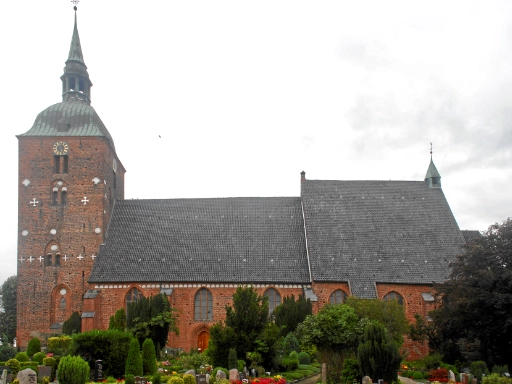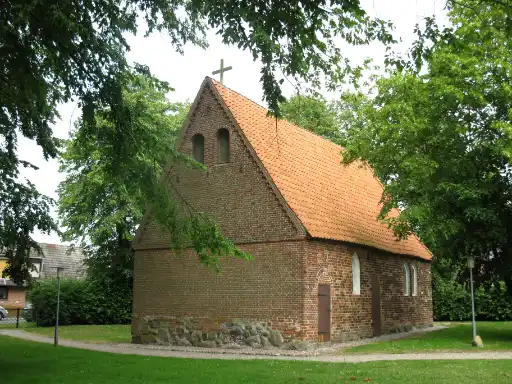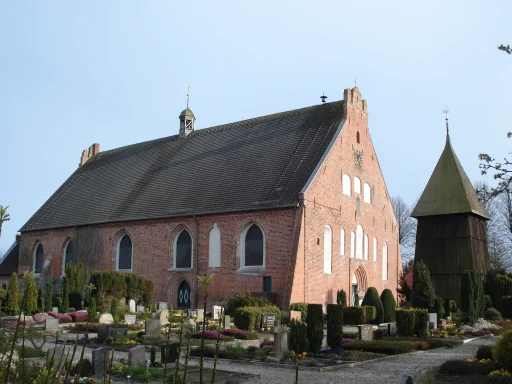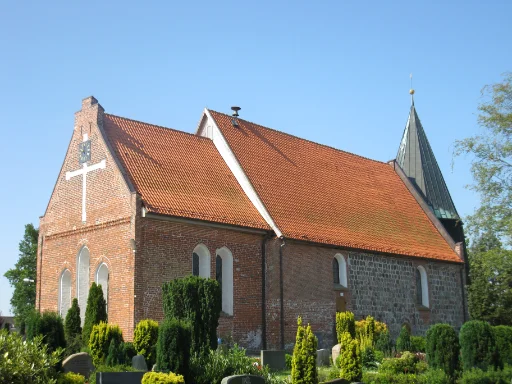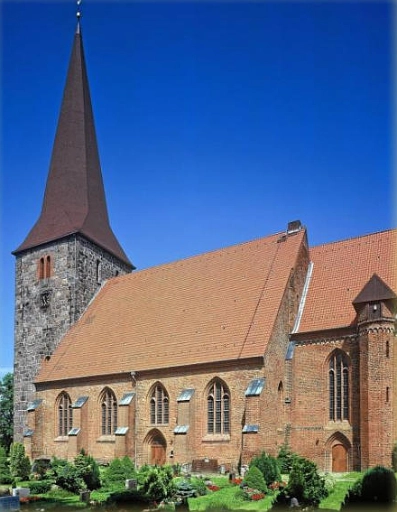Overview of all churches on Fehmarn for sightseeing and church services
On Fehmarn, there are several particularly beautiful churches in Burg, Landkirchen, Bannesdorf and Petersdorf that you can visit to see as a tourist attraction. Of course, you can also visit them to pray, to take part in church services and many other events.
Read on to get a detailed overview of the churches and what they have to offer.
The most important information about the churches in a nutshell:
How many churches are there on Fehmarn?
In which places are there churches?
Are there regular church services on Fehmarn?
Are there other events that take place in the churches?
Is there an entrance fee to visit the churches?
Churches in Burg on Fehmarn
Here you can see an overview of the churches and chapels in Burg auf Fehmarn, the capital of Fehmarn.
St. Nicholas's Lutheran Church
The Protestant St. Nikolai Church in Burg on Fehmarn is the central place of worship in the island's capital and impresses with its Gothic architecture.
Contact details for the parish or church in Burg:
Website: https://www.kirche-fehmarn.de/burg
Phone: +49 4371 22 50
Address: Breite Straße 47, 23769 Fehmarn OT Burg
History of the St. Nikolai Church in Burg
The St. Nikolai Church is a Protestant Lutheran three-aisled hall church and was built in the 13th century, between 1230 and 1250.
Together with St. Peter's Church in Landkirchen, it is one of the oldest buildings on Fehmarn and is dedicated to St. Nicholas, the patron saint of seafarers and grain traders.
In the 15th century, the church was enlarged in the late Gothic style. The morgue, the Garwekammer, the spiral staircase on the south side and the bell tower were built during this time.
In the 19th century, the church was then renovated twice. The first time starting in 1817 and the second time starting in 1846. During this time, various drawings were made, among other things. Further progress was made in the 1930s. During this time, the nave and the steeple were renovated and an extension to the tower was removed. In 1936, a warm air heating system was installed and in 1939, the sculptor Georg Matthiesen carved the coats of arms and house marks of Fehmarn into the church pews made of Brazilian pine.
Catholic Church of St. Francis Xavier
The Catholic Church of St. Francis Xavier is the main church of the Catholic community on Fehmarn. It offers church services and other religious events.
Contact details for the parish or church:
Website: https://www.fehmarn.de/poi/st-franziskus-xaverius-kirche
Phone: +49 4371 28 97
Address: Blieschendorfer Weg 13, 23769 Fehmarn OT Burg
History of the Church of St. Francis Xavier in Burg
The church was built between 1954 and 1955 and consecrated on December 3, 1955 to meet the needs of the growing Catholic community on Fehmarn. It is known for its modern architecture and the special atmosphere it radiates.
St. Jürgen Chapel
The chapel was built in the Middle Ages and served as a pilgrimage chapel for a long time. It is dedicated to St. George (Jürgen in Low German) and is one of the smaller places of worship on the island.
Contact details for the parish or church:
Website: https://www.fehmarn.de/poi/st-juergen-kapelle
Phone: +49 4371 50 66 40
Address: Kappellenweg 13, 23769 Fehmarn OT Burg
The chapel is open daily between May and September, otherwise only during services.
History of the St. Jürgen Chapel in Burg
The chapel was built in the 13th century on a foundation of boulders. The chapel is built in the Gothic style, which can also be recognized by the pointed arched windows typical of the time. Even today, you can still see a sacrament house from the 13th and wall paintings from the 15th century.
Originally, the chapel was part of a hospital for the care of people suffering from the plague or leprosy. As was common in the Middle Ages, the buildings were therefore located outside the city.
In the 17th century, a square was set up near the chapel where witches were burned.
Churches in Landkirchen on Fehmarn
There is only one church in Landkirchen, the Protestant St. Peter's Church Landkirchen, which, together with the St. Nikolai Church, is the oldest church on Fehmarn.
Evangelical Church of St. Peter, Landkirchen
The Petrikirche in Landkirchen is one of the island's central religious buildings and offers not only church services but also many cultural events.
Contact details for the parish or church in Landkirchen:
Website: https://www.kirche-fehmarn.de/landkirchen
Phone: +49 4371 68 94
Address: Hauptstraße 30, 23769 Fehmarn
History of St. Peter's Church in Landkirchen
Based on records, experts assume that the Petrikirche in Landkirchen was built around the year 1230. At that time, Landkirchen was still referred to in the records as “de Landt Kercke”.
Based on this, the church in Landkirchen, together with the St. Nikolai church in Burg, is the oldest church on Fehmarn. Originally, there was only the brick church with three naves, which are the longitudinal rooms of churches. In 1638, the steeple was built a few meters away from the church. This wooden steeple has held up so well that it was only fully restored in 2016.
The location of St. Peter's Church was special. In those days, the church was still the ecclesiastical center of the parish and administrative district. In addition, it stood at the former intersection of the two roads that ran from west to east and from south to north on Fehmarn.
Churches in Bannesdorf on Fehmarn
The church in Bannesdorf was once built mostly of fieldstones and has a wooden bell tower, which is rather unusual for Fehmarn.
St. Johannis Church, Bannesdorf
The St. Johannis Church in Bannesdorf was built in the 13th century and is known for its wooden bell tower.
Contact details for the parish or church:
Website: https://www.kirche-fehmarn.de/bannesdorf
Phone: +49 4371 33 41
Address: Bürgermeister-Scheffler-Straße 1a, 23769 Fehmarn
History of the St. Johannis Church in Bannesdorf
The church was built like the other churches on Fehmarn in the 13th century, between the years 1200 and 1299. The church was not mentioned in any documents from that time.
What is remarkable about it is that it was built largely from fieldstones. Wood examinations have shown that the wood for the roof structure was felled around 1426 or 1436.
Around 1701, the wooden bell tower was added to the west and around 1875, mainly on the southern part of the church, the field stones were exchanged for bricks.
Churches in Petersdorf auf Fehmarn
Evangelical Lutheran Church of St. John the Baptist, Petersdorf
The St. Johannis Church in Petersdorf is the highest church on Fehmarn and offers not only church services but also numerous cultural events.
Contact details for the parish or church:
Website: https://www.kirche-fehmarn.de/petersdorf
Phone: +49 4372 209
Address: An d. Kirche 4, 23769 Fehmarn
History of the St. Johannis Church in Petersdorf
The two-aisled church on Fehmarn was built at the beginning of the 13th century. It was enlarged as early as 1300 and two additional aisles were added. According to the book "The architectural and art monuments of the province of Schleswig-Holstein II." by Richard Haupt, the church had a lot of misfortune.
In 1559, one of the towers burnt down and was rebuilt in 1566. This tower collapsed just one year later, in 1567. A new tower was then built, which is between 57 and 64 meters high, depending on the source. This made the church the tallest church on Fehmarn.
According to Haupt, in 1856 the church was the victim of a “highly barbaric restoration”, in which, among other things, furnishings were replaced and art and paintings were simply painted over.
Other churches, chapels and parishes on Fehmarn
In addition to the well-known churches mentioned above, there are two other religious buildings on Fehmarn.
Christ Church Fehmarn in Klausdorf
This religious organization does not have a church in the traditional sense, but it still offers services and other events. The community is part of the Union of Evangelical Free Churches in Germany.
Contact details for the parish or church:
Website: https://www.efg-fehmarn.de/
Telefon +49 4372 208
Address: Dorfstraße 22, 23769 Fehmarn
Upcoming events and a wealth of other information can be found on the church's website.
Peter-and-Paul-Chapel, west of Puttgarden
Website: https://www.fehmarn.de/poi/peter-und-paul-kapelle
Phone: N/A
Address: Unnamed Road, 23769 Fehmarn
History of the Peter and Paul Chapel near Puttgarden
The St. Peter and St. Paul chapel was Fehmarn's first place of worship and was built by the Danish King Canute the 6th at the request of the Pope. The chapel was mentioned in a document in 1198 and was located near Puttgarden.
In those days, pilgrims who had survived the crossing from Lolland to Fehmarn could offer thank-offering at the offertory box on the beach.
Today, a small shelter with a bell tower and a memorial plaque commemorates the former place of worship, which was completely destroyed in 1644.
You have booked a Vacation accommodation on Fehmarn and looking for more Sights on Fehmarn or would like to Rent sports equipment or beach chairs? Follow the links for more information.

